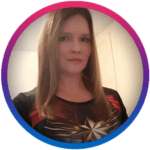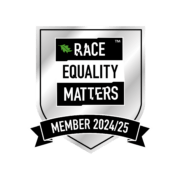Bisexual Visibility Day: A blog by Charlie Hart (she/they), HR Analyst at Together

Bi Visibility Day takes place on 23 September each year to recognise and celebrate bisexual people, the bisexual community, and the history of bisexuality. For the day this year Charlie Hart (she/they) who is HR Analyst at Together was kind enough to share a blog on their own lived experience of identifying as a bisexual woman and how that can or has in the past impacted their mental health.

Charlie Hart
I have decided to write about some my personal experiences as a bisexual woman, highlighting some of the bi-phobic attitudes that I have encountered over the years and the impact these had on me and my mental health and wellbeing. This may not be an easy read, it was certainly not easy to write, but I hope it may be relatable to others and a helpful insight for LGBTQIA+ allies
Definitions
“Bisexual” or “bi” means we experience both heterosexual attraction and homosexual attraction.
“Pansexual” or “pan” means we experience attraction to an individual, and their gender is immaterial.
Some bi or pan people may also identify as “queer”, which is less clearly defined, more flexible term (historically “queer” was a homophobic slur, but since reclaimed by many within the LGBTQIA+ community).
Personally, I am comfortable using any of these terms to describe myself.
Why?
“Why talk about your sexuality at work?”, you may be wondering. “How is this professional / appropriate / relevant”, are questions I have seen asked of LGBTQIA+ role models. Let me be clear – this is not a blog about sex; I aim to promote understanding and acceptance of this normal human characteristic.
This is about my experiences as a member of staff from a sexual orientation minority group, which is part of my authentic identity, the “whole self” I expect to safely bring to work, unmasked.
Sexual orientation is a protected characteristic under the Equality Act 2010, and we should be able to talk freely about sexuality without fear of discrimination. I am autistic as well, another protected characteristic, an intersection which is very common indeed, but particularly challenging in some ways.
Not everybody with a protected characteristic feels psychologically safe and comfortable to “step up” as a role model in the workplace, nor in their community, but positive visible role models can help foster a culture of inclusion and belonging – which matters to me. Bisexuality is far more common than people realise. You all have colleagues, friends, and possibly family members, who are bi. However, they may not be visible or “out” about their sexuality – especially if they are in a “straight-passing” relationship, and especially if they are from a background where their true sexuality would not be accepted by some and “straight” may be the societal expectation.
Coming out story
I was sixteen when I first concluded that I was bi. I was open about this with my best friend, but not with my family or wider social circle. However, the truth came out during a sixth form residential trip over a boozy game of truth or dare. As a bullied undiagnosed-autistic teenager, I was socially awkward and desperate for validation and acceptance. Bisexuality seemed so normal to me, I had hoped that among the reactions from other kids would be some nonchalant “so what, me too” or something. Instead, all I got was a barrage of intrusive questions.
When it dawned on me that I had over-shared, that my revelation was not met with understanding and acceptance, I became overwhelmed and slunk off to hide in a playground alone. In the days following that school trip, another friend was hostile towards me because I had gone camping with her the previous year without telling her about my sexuality. I started to become more withdrawn, and socially anxious, especially around other girls.
That was in the mid-90s, and I believe, I hope, that teenagers today are generally more open-minded and accepting. Things got easier at university, in this respect anyway, because at least there I was able to join the LGBT society and make some like-minded friends.
Bi-phobia
My coming out story mentioned two bi-phobic microaggressions, and here are some more of the bi-phobic attitudes and microaggressions that I have personally encountered:
Men (including some long-term boyfriends) who assume I cannot be in a monogamous relationship for long, and that I will inevitably cheat on them or leave them for a woman. We do not have to “pick a side”, we fall in love with a person. We are just as capable of monogamy as anybody else, if that is what we want.
The jokes. Okay, so I like a giggle and personally I would chuckle if somebody said, “well I suppose it doubles your chances of a date on a Saturday night”. Some of the bi jokes are offensive, and some bisexual people are more easily upset about the jokes than others. Sexuality is a sensitive subject to many, and we have a right to our dignity and not to be the subject of bullying jokes and banter. If in doubt about how your joke may be received, please resist making it.
People who think bisexuals are not a valid part of the LGBTQIA+ spectrum, and that we should not be at Pride, especially if we are in a straight-passing relationship. Firstly, the B stands for Bisexual, we are still a minority group. Secondly, please do not assume our gender, nor the genders of our partners.
Women who assume I fancy them, just because I am friendly towards them. This is a particular issue for autistic bisexuals, as we can struggle with the nuances of communication, particularly non-verbal communication such as body language, when communicating with our “neurotypical” peers. This has led to many misunderstandings, therefore heightened social anxiety, isolation, and phases of depression.
Stepping up
That last issue caused me some problems at work, many years ago, but as a result for several years I stopped being open about my sexuality and even stopped disclosing it on the HR system at my previous employer (and I work in HR). All that changed in 2019 when I read an article by Stonewall about why LGBTQIA+ role models are important, with their top ten tips about how to be a positive visible role model. That was just the gentle push I needed to realise I have nothing to hide, and I could “step up” as a bi/pan rep for the LGBT+ inclusion group at work.
For as long as I remain comfortable disclosing my authentic identity, I will talk about it and write about it, to help others feel less alone and more understood and supported. I hope to inspire others to tell their own stories, and together we can foster a culture of psychological safety and acceptance.


